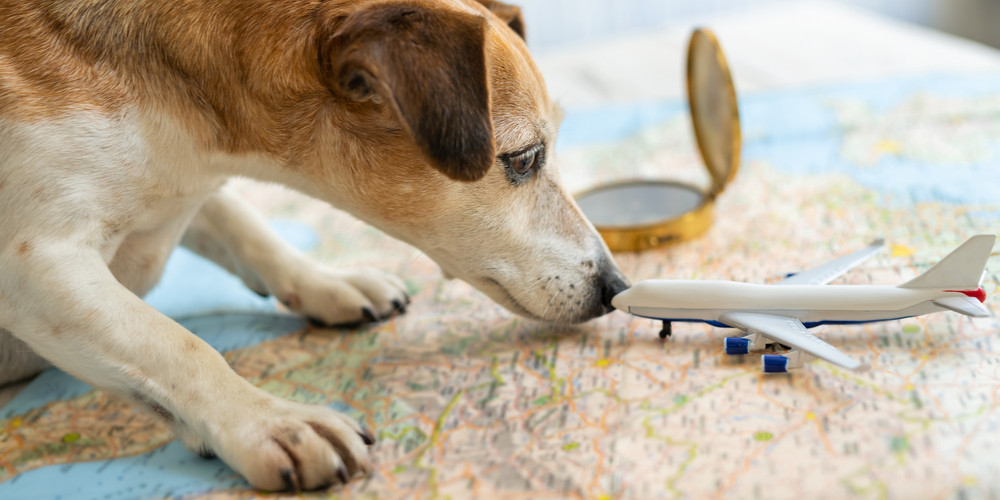
It is a dream come true for many to travel internationally with their dog and other pets. Dogs mean a lot to people these days. Some take their dogs as their closest friend and always want to be close to them. Such people end up asking questions such as "how to travel with dog in car?", "can I travel with my dog?", what are the best places to travel with dogs" etc. If you are among those asking these questions, then know it is possible. However, you need to know how to travel with a dog as there are rules and regulations to keep.
Travelling from one country to another with your dog can be overwhelming. This guide will teach how to travel internationally with a dog and how to travel with a dog by plane.
Research Your Destination
This is the first thing to do before you board a plane or car to travel with your dog. Just as we have different countries, we also have different rules and requirements on dog's immigration. Nevertheless, a rabies shot and certificate are a must in any country you are travelling to. It is important to research the rules of the country you want to go to as some countries will not allow dogs if they have received their rabies shot less than thirty (30) days before travel. In some countries, your dog must receive a tapeworm treatment, and this must be 24 – 120 hours prior to your travel.
How to travel with a dog?
The following steps must be carried out before boarding the next plan for your trip with your dog:
1. Vaccinate your dog and get it microchipped

Most countries require that you not only vaccinate your dog but also have it implanted with a microchip. The vaccine is a must if you are travelling to rabies controlled country. This vaccination must take place before you enter the country for at least 30 days. You don't need to wait to vaccinate your dog before you travel. Do it often for the life and health of your dog and you too. The purpose of the microchip implant is to easily trace where your dog is when it is missing or ran away. In some countries, more vaccinations other than rabies are required. For instance, your dog is required to carry out a distemper vaccination in Germany, United Kingdom, Italy, Spain and France. In Australia, your dog is expected to carry out vaccination on canine influenza, para-influenza, and bordetella. At the same time, it should be treated for leptospirosis, ehrlichiosis, brucellosis, and leishmaniosis. So, consider the vaccine requirements of the country you are going to before travelling.
2. Ask for a pet passport or veterinary health certificate

Every country requires dog owners to have a vet health certificate before departing. This certificate should be filled out properly. If you don’t know the documents needed, contact travel expert companies such as Pickvisa for immediate assistance. With their help, you will get all the copies of the required veterinary paperwork – a bilingual health certificate. When you have gotten one, tell your vet doctor to fill it out. This should be done within ten days of entering the destination country. Some bodies endorse this certificate for some countries. For instance, CFIA or USDA accredited veterinarians endorse the health certificate for those travelling from Canada or the United States of America.
It is easier to travel with your dog if you are living in a European country, as dog owners can easily bypass mandatory health certificates for a dog passport instead. Individuals with a dog passport can freely travel with the European Union.
3. Check if quarantine is mandatory

Knowing how to travel internationally with a dog is not complete without knowing if you must quarantine your dog on arrival. Most dog owners consider it as the scariest part of their international trip with their favourite dog. Most countries do not mandate dog quarantine when you follow the steps mentioned above. Nevertheless, some countries do not want to know if you have vaccinated your dog or not; your dog must pass at least seven days of quarantine. To know the requirements, dont forget to contact responsible bodies.
4. Is your dog’s breed banned?

Another important step to consider on how to travel with dog in car is the breed of your dog. There are dog's breeds that are considered violent. Some countries won't allow these dogs even if the dog is vaccinated. These countries will send the dog back home. They might even have your dog euthanized. The common breeds of dog that are banned by most countries include Japanese Tosa Inus, Rottweilers, Fila Brasileiros, Staffordshire Bull Terriers, Pit Bulls, Neapolitan Mastiffs and Dogo Argentinos. If your dog is one of these breeds, check if your destination country allows such to avoid parting with your dog.
5. Other miscellaneous requirements

There is a possibility to see extra dog immigration requirements when you make an enquiry about the dog policy of the country you are travelling to. You might read that a blood titer test and import permits are needed. Countries like the Bahamas, and Australia ask for import permits. High rabies countries might require a blood titer test for your dog. This test may not be mandated for every country so do your research well and first
6. Call your airline

Calling the airline is the last step to take when you want to travel with your dog. The purpose of calling them is to know the steps involved in travelling with a dog. Every airline has its own rules and regulations. The size of your dog may be a serious case to consider in some airlines. You may be allowed to take the dog to the cabin with you, depending on the dog's size. If the size is against the airline's pet policy, it might be taken to the cargo. So, call the airline ahead of time to find out more.
Common Issues & Accidents

Facing issues while travelling with your dog is possible and inevitable. Adequate preparation against possible issues will make your travel with your dog stress-free and enjoyable. You will learn from this section how to deal with missed connections, delays and accidents in your travel with your dog.
• Missed Connections
The crate of your dog may not get reloaded when you have a connecting flight. Although this occurrence is rare, inform the airline that your dog is with you. The flight attendants can check again to make sure your dog is on board before the plane takes off. Go to the airport with a photo of your dog in case it gets missing. Having tags on the collar of your dog is something you must not fail to do. These tags are for identification. If you are still asking "can I travel with my dog?", the answer is yes. Just follow these guides.
• Delays
Flight delay is a common phenomenon when it comes to international travelling. A delay when you are travelling with a dog is a major concern for most travellers. Your dog might be left under the airplane in a non-pressurized cabin with no fresh air when it is travelling as excess cargo. To prepare against delay, provide frozen water for your dog and add blankets in the dog's crate. Also, inform the airline attendant that your dog is with you when there is a delay. This will make them remove it quickly.

• Injuries and accident
There are risks associated with international travel. You need to prepare ahead of time how to take care of your dog in case you sustain an injury or become sick, which might require you to be hospitalized. There are health insurances that can cover such unexpected illness and injury and also assist your dog in returning home in case of emergency. They will pay for your dog to return home to your country safely and be taken good care of by your family till you get better.
Summarize

Dogs have become part of human life that most people can't do without their dogs. People like this want to travel with their dogs to the state or country they are going to. While they have this desire, most of them are not sure of the possibility. This is why there are lots of frequently asked questions on travelling with dogs online. Some of the questions are the best places to travel with dog, how to travel with a dog in a car, can I travel with my dog and how to travel with a dog by plane. These questions have been clearly answered from the article you have read. So, follow all the steps, yield to the guide and have a great time travelling with your dog. Safe trip!

